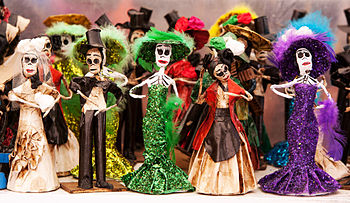Be careful about extra-biblical traditions

English: Catrinas, traditions figures of day of the dead celebrations in Mexico (Photo credit: Wikipedia)
In Ministry Today’s daily newsletter they posted an article today called 10 of the Most Fiercely Defended Traditions in Church. It’s a silly discussion about the number of comments received about worship style, pastor duties, and so on. It’s not very helpful or edifying. However…
Many extra-biblical church traditions are problematic
No, I am not coming against the Day of the Dead, Shrove Tuesday, or Mardi Gras. These go far beyond extra-biblical into worldly events. But there are many things we take for granted in our churches which need to be looked at because of their extra-biblical nature. They are not necessarily evil, but we do need to carefully adjust to make them work well.
Let me give you a small list:
- Sinner’s Prayer: Actually, this is a serious problem. Not only is it extra-biblical, but it is contrary to the Great Commission. Jesus did not tell us to get people saved by reciting the Sinner’s Prayer. He told us to “Go therefore and make disciples of all the nations, baptizing them in the name of the Father and the Son and the Holy Spirit, teaching them to observe all that I commanded you…” Matthew 28: 19-20 NASB Now if we are careful, the sinner’s prayer can help us get a person’s attention so that we can then disciple him or her. However, the sinner’s prayer has a conversion rate of around a half of a percent [.5%] without counseling and followup.
- Adult Sunday School: Nothing wrong here, but is it the best use of your time and resources? How often have you experienced real ministry in a Sunday School class? Is it participatory ministry or a dead lecture?
- Sermons: Have you really read I Corinthians 14 lately? Does the following scripture passage really sound like the church service you went to last Sunday? Where’s the sermon? Where’s the choir or worship team? Where’s the offering (or the announcements)? Where’s the eucharist or Holy Communion service? This is the only New Testament description of a Sunday Service of which I am aware.
Whenever you come together, each of you has a psalm, has a teaching, has a tongue, has a revelation, has an interpretation. Let all things be done for edification. If anyone speaks in a tongue, let there be two or at the most three, each in turn, and let one interpret. But if there is no interpreter, let him keep silent in church, and let him speak to himself and to God. Let two or three prophets speak, and let the others judge. But if anything is revealed to another who sits by, let the first keep silent. For you can all prophesy one by one, that all may learn and all may be encouraged. And the spirits of the prophets are subject to the prophets. For God is not the author of confusion but of peace, as in all the churches of the saints. (I Corinthians 14: 26-33 NKJV)
- Slain in the spirit: For those who don’t know, this is when people fall over under the power of the Holy Spirit when they are being prayed for. I’m not denying its reality. I know it really happens and by all reports it’s a wonderful time with the Lord. I’m just saying the justification for the practice is barely Biblical and probably extra-biblical. It’s certainly not important doctrinally.
Basically what I am saying is that many of the churchly activities are social or psychological events without a firm Biblical basis. None of things I mentioned are evil. But you need to pray for wisdom and follow the leading of the Lord to make them useful and edifying to the people in the church.

Pingback:Hidden in preparation | daily meditation